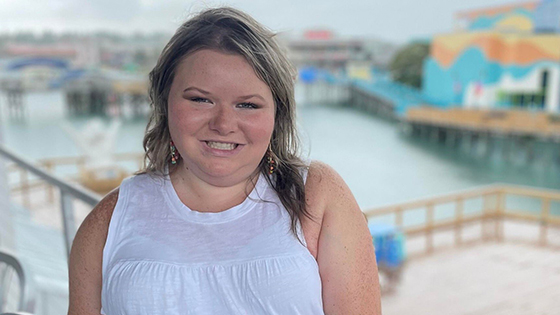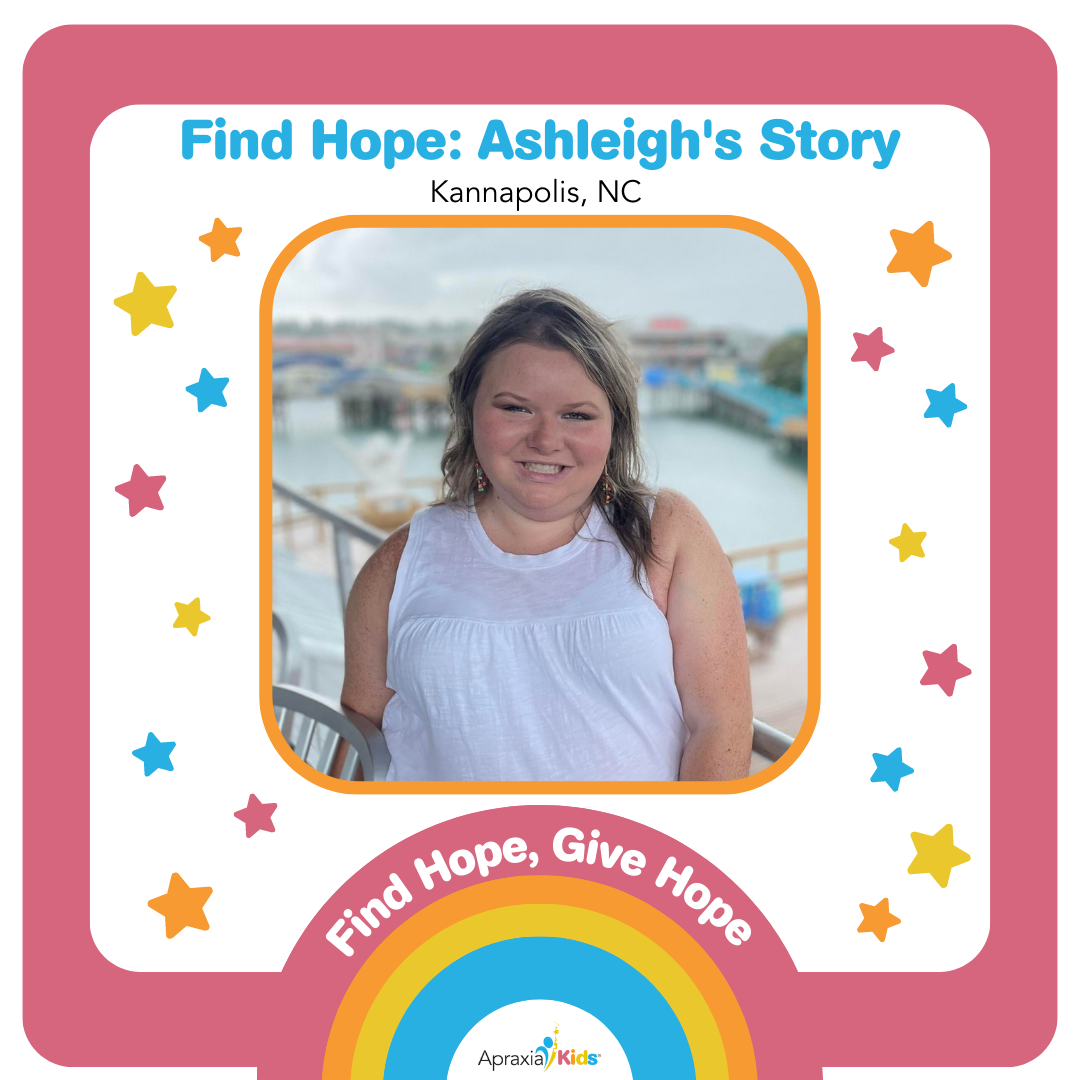
15 Aug My Journey Toward Confidence by Ashleigh Davis

I was diagnosed with Apraxia when I was two years old. According to my parents, I started babbling some, but regressed when I had an allergic reaction to peanut butter. I would say “mama” and “dada” but not much else. I did not start walking until I was 15 months old. My parents also said that I did not put stuff in my mouth and was not teething like a typical toddler. Because of this, my parents had me evaluated and was diagnosed with verbal apraxia. I did not start speech therapy until I was three since verbal apraxia was a new diagnosis and they did not want to over diagnose me. They told my parents to read to me until I was three. I went to speech therapy until I was in the ninth grade.
My speech issues caused me to be very shy. I can remember people wondering what was wrong with me. I heard some people say that I had a weird accent. I had a difficult time making friends because I worried about what people would think about me. I also struggled in school because I had a difficult time processing and trying to think. It was difficult getting people to understand me and I would give up when people were not able to. To this day, I still struggle saying the “r” sound. I once went to a restaurant and ordered a medium rare steak and got medium well because I substituted the “r” for “w”.
When I graduated high school, I did not believe I could go on to college, but I still needed to work. My first job was a preschool assistant teacher. To get the job, I had to be honest and tell the director that I had speech issues. This began the process of me being more open and honest about my apraxia. I even told a parent about my speech issues to help them with their child. Being a preschool assistant gave me the desire to become a preschool teacher. Even though I was nervous, I applied to Rowan Community College and finished my associate degree with all As. I am now headed to Western Carolina to finish my bachelor’s degree and get my teaching license. This helped my confidence, but what helped even more is when I entered a local pageant; now I hold several titles.
There are times that I get frustrated because I still find it difficult to pronounce certain words correctly, but I work hard because I know that I will have to teach preschoolers how to speak. I have a real desire to help small children who are just like I was. I am especially drawn to shy children who do not speak much. My goal is to help them, just like those who helped me.
My message of hope to people who are diagnosed with apraxia is to not give up. I know it is frustrating because you want to communicate but people do not always understand you. Don’t give up. Do not be embarrassed. You are not alone in your struggles. Be honest about your struggles and you will find others who are just like you.
Be inspired by more stories today and learn about how you can Give Hope!
Visit, FIND HOPE, GIVE HOPE

I was diagnosed with Apraxia when I was two years old. According to my parents, I started babbling some, but regressed when I had an allergic reaction to peanut butter. I would say “mama” and “dada” but not much else. I did not start walking until I was 15 months old. My parents also said that I did not put stuff in my mouth and was not teething like a typical toddler. Because of this, my parents had me evaluated and was diagnosed with verbal apraxia. I did not start speech therapy until I was three since verbal apraxia was a new diagnosis and they did not want to over diagnose me. They told my parents to read to me until I was three. I went to speech therapy until I was in the ninth grade.
My speech issues caused me to be very shy. I can remember people wondering what was wrong with me. I heard some people say that I had a weird accent. I had a difficult time making friends because I worried about what people would think about me. I also struggled in school because I had a difficult time processing and trying to think. It was difficult getting people to understand me and I would give up when people were not able to. To this day, I still struggle saying the “r” sound. I once went to a restaurant and ordered a medium rare steak and got medium well because I substituted the “r” for “w”.
When I graduated high school, I did not believe I could go on to college, but I still needed to work. My first job was a preschool assistant teacher. To get the job, I had to be honest and tell the director that I had speech issues. This began the process of me being more open and honest about my apraxia. I even told a parent about my speech issues to help them with their child. Being a preschool assistant gave me the desire to become a preschool teacher. Even though I was nervous, I applied to Rowan Community College and finished my associate degree with all As. I am now headed to Western Carolina to finish my bachelor’s degree and get my teaching license. This helped my confidence, but what helped even more is when I entered a local pageant; now I hold several titles.
There are times that I get frustrated because I still find it difficult to pronounce certain words correctly, but I work hard because I know that I will have to teach preschoolers how to speak. I have a real desire to help small children who are just like I was. I am especially drawn to shy children who do not speak much. My goal is to help them, just like those who helped me.
My message of hope to people who are diagnosed with apraxia is to not give up. I know it is frustrating because you want to communicate but people do not always understand you. Don’t give up. Do not be embarrassed. You are not alone in your struggles. Be honest about your struggles and you will find others who are just like you.
Be inspired by more stories today and learn about how you can Give Hope!
Visit, FIND HOPE, GIVE HOPE
Credentials:
Hours of Operation:
Treatment locations:
Address:
,
Phone:
Email:
Overall Treatment Approach:
Percent of CAS cases:
Parent Involvement:
Community Involvement:
Professional consultation/collaboration:
Min Age Treated:
Max Age Treated:
Insurance Accepted:




